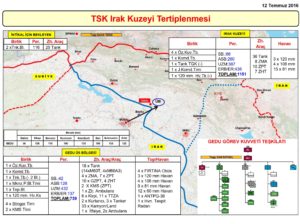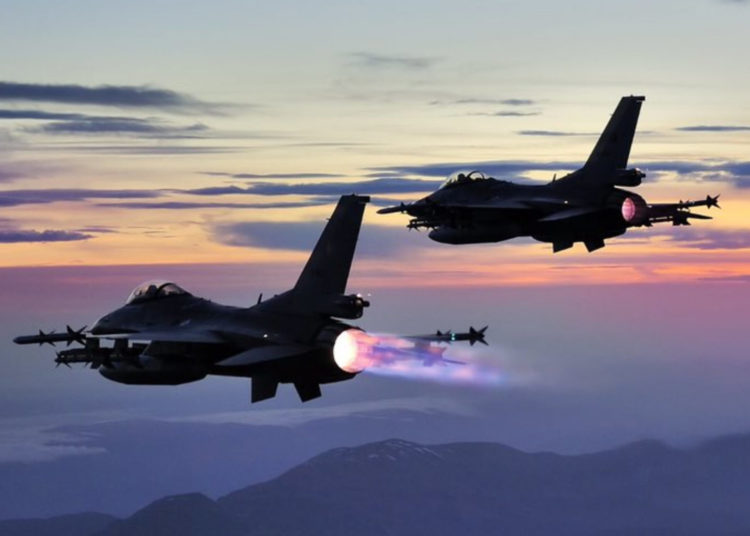Abdullah Bozkurt/Stockholm
Violations of Iraq’s airspace and territory by the Turkish military have tripled on a daily average since 2017, records submitted to the United Nations Security Council (UNSC) by Baghdad have shown.
The repeated violations in terms of incursions into Iraqi territory by Turkish troops, the maintenance of bases, cross-border bombardments and Turkish warplanes’ entry into Iraqi airspace prompted Baghdad to file a complaint with the UNSC.
The records show that it has become almost a daily occurrence for Iraq’s Foreign Ministry to issue notices to the Turkish Embassy in Baghdad and call on Turkey to respect the independence and sovereignty of Iraq.
“The bombardment of Iraqi territory by the Republic of Turkey and the presence of that country’s military forces inside Iraqi territory on the pretext of protecting its national security are violations of the sovereignty of Iraq, the principles of good neighbourliness and the principles of the Charter of the United Nations and international law,” said Bahr Aluloom, Iraqi ambassador to the UN, in a letter to the UNSC on June 16, 2019.
“The sovereignty, territorial integrity and borders of Iraq are a red line. My government will not allow them to be undermined or violated in any way,” he added.
Turkish violations of Iraqi territory and airspace between August 2017 and December 2018:
According to the records, Turkey violated Iraq’s territory and airspace 3.356 times between August 1, 2017 and December 15, 2018, averaging nearly seven violations a day. The number of violations increased to 3,523 between December 1, 2018 and December 4, 2019, a daily average of nearly 10 violations.
A spike was recorded between July 13, 2020 and January 7, 2021 when the violations by Turkey totaled 4,068, which is equivalent to some 23 daily violations on average. That means Turkey has tripled its violations of Iraq’s territorial borders and airspace since August 2017.
The unusual rise in the number of incidents in which Turkey sent troops or warplanes into Iraq is yet another indication of how the government of President Recep Tayyip Erdoğan has increasingly been relying on hard power to project his government’s ambitions in its neighborhood. It also explains why President Erdoğan finds it useful to make frequent military incursions into Iraq to divert Turkish voters’ attention from domestic economic and financial problems.
Turkish violations of Iraqi territory and airspace between December 2018 and December 2019:
The Turkish government’s stated justification for the violations is Iraq’s lack of ability to deal with the presence of terrorists in its own territory. Responding to allegations on July 8, 2020 Turkey’s ambassador at the UN, Feridun H. Sinirlioğlu, claimed that “Turkey is obliged to take appropriate measures against terrorist threats to Turkey’s security emanating from Iraq.”
However, the Iraqi ambassador rejected the Turkish government’s explanations of the violations on the pretext of battling against terror and said, “My government categorically rejects the specious arguments and pretexts put forward by the Republic of Turkey to justify ongoing military operations and violations of the sovereignty and territorial integrity of Iraq.”
Ambassador Aluloom also added that his government was ready to cooperate with its neighbor to find common ground and peaceful solutions that will bring an end to these repeated violations.
Turkish violations of Iraqi territory and airspace between July and September 2020:
The presence of Turkish troops in Iraq is also one of the lingering problems in bilateral relations. In December 2015 Turkey’s deployment of a battalion and dozens of tanks to Bashiqa, officially called Gedu, a base near the Iraqi city of Mosul for what the Turkish government claimed was training and assisting local Sunni and Kurdish forces against the Islamic State in Iraq and Syria (ISIS) sparked a diplomatic crisis.
Baghdad summoned the Turkish ambassador on December 5 to demand the immediate withdrawal of the Turkish troops, and a strong reaction also came from Iran and Syria. The federal government threatened that it would go to the UNSC with a formal complaint if Turkey did not withdraw its troops.
To allay Iraq’s concerns, Turkey eventually decided to “reorganize” its military personnel at the Bashiqa camp after then-Turkish Foreign Ministry Undersecretary Feridun Sinirlioğlu and National Intelligence Organization (MİT) Undersecretary Hakan Fidan visited Baghdad for talks. Turkish officials never explained what the troop reorganization would involve, but apparently a deal was made in Baghdad to withdraw tanks from the base.
Turkish violations of Iraqi territory and airspace between September 2020 and January 2021:
After a bitter week-long dispute with Baghdad, Turkey reportedly partially withdrew some of its troops from the camp near Mosul and repositioned them near the Turkey-Iraq border. Turkish newspapers quoted an unnamed senior Turkish official source who said, “Within the scope of the new arrangement, a convoy of 10 to 12 vehicles carrying some of our troops in Bashiqa has moved towards northern Iraq.”
Nordic Monitor previously published a report that exposed how Turkey staged a false withdrawal of tanks to ease tensions and soften reactions in 2015.
According to a classified Turkish military document that shows the Turkish army presence in northern Iraq as of July 12, 2016, there were 1,151 troops from various force units including four battalions from the elite Special Forces Command — 36 tanks and some two dozen armored personnel carriers and armored combat vehicles in total. In Bashiqa alone Turkey maintained 739 troops including 42 officers and 18 noncommissioned officers. The base was equipped with 18 tanks, four 155-mm artillery cannons, a radar unit and other military hardware. An additional 25 tanks and 116 troops were on standby and ready to be transported to Iraq’s north.
Since then, Turkey has expanded its footprint in Iraq, sending more troops and equipment in the north of Iraq.













